Description
Contents – Seven Baskets Full : The All-Embracing Lord’s Supper
Acknowledgements
Preface
Abbreviations
Prologue – A Disturbing Question
Part One – Scripture
1. Meal-Sharing in the Old Testament
A. Hospitality Meals
A1. Gods as Hosts and as Guests
A2. Yahweh as Host and as Guest
A3. Welcoming Guests
A4. Domiciling Guests
B. Other Meals
B1. Family Meals
B2. Festive Meals
B3. Covenantal Meals
B4. Sacrificial Meals
B5. Sapiential Meals
B6. Prophetical Meals
B7. Pilgrimage Meals
B8. Idolatrous Meals
Conclusion
2. The Meals Jesus Shared
A. Jesus as Host
A1. The Good Shepherd
A2. The Living Water
A3. The Heavenly Bread
A4. The Nourishing Word
A5. The Compassionate Host
B. Jesus as Guest
B1. With Marginalized Sinners
B2. With Rich Patrons
B3. With Loving Friends
B4. With Sanctimonious Pharisees
Conclusion
3. The Last Supper
A. The Last Supper as an Event
A1. The Occasion of the Meal
A2. The Venue of the Meal
A3. The Participants at the Meal
A4. The Menu of the Meal
A5. The Blessings during the Meal
B. The Last Supper as a Message
B1. The Message Enacted
B2. The Message Explained
Conclusion
4. The Silence of the New Testament
A. The Silence of the Synoptics
A1. The Gospel of Mark
A2. The Gospel of Matthew
A3. The Gospel of Luke
B. The Silence of the Acts of the Apostles
B1. The Pre-Pauline Phase
B2. The Pauline Phase
C. The Silence of Paul
C1. The Pauline Letters
C2. The Deutero-Pauline Letters
C3. The Pastoral Letters
D. The Silence of the Johannine Corpus
D1. The Gospel of John
D2. The Johannine Letters
D3. The Book of Revelation
E. The Other New Testament Writings
E1. The Letter to the Hebrews
E2. The Remaining Letters
Conclusion
Part Two – History
5. The Lord’s Supper in the Early Church
A. Sharing in the Ecclesial Communion
A1. A Community of Faith: A Covenantal Meal
A2. The Fellowship of Love: A Family Meal
A3. Living in Hope: A Sacrificial Meal
A4. Accepting the Local Food:
A Contextualized Meal
A5. The Power of Prayer: An Empowering Meal
A6. The Meaning of Conversion:
An Inclusive Meal
A7. The Salt of the Earth: An Appetizing Meal
A8. The Light of the World: An Attractive Meal
A9. The Emmaus Disciples: A Synodal Meal
A10. Religious Life: A Forgotten Meal
B. Sharing in the Cosmic Communion
B1. An Effective Remembering
B2. Remembering as Thanksgiving
B3. Remembering as Caring
C. Sharing the Flesh of the Lamb
C1. Christ Our Passover
C2. The Lucan Variant
C3. Promoting Social Justice
D. Sharing the Blood of the Lamb
D1. Remembering with Faith
D2. Remembering with Hope
D3. Remembering with Love
D4. Remembering with Horror
Conclusion
6. The Apostolic Fathers
A. The First Letter of Clement
A1. Clement’s Letter to the Corinthians
A2. Church Unity More Important than Cult
A3. Ministries within the Church
A4. Authentic Life as Real Worship
A5. Love: The Source of Christian Unity
B. The Second Letter of Clement
B1. The Church as the Body of Christ
B2. Love as Authentic Worship
C. Ignatius of Antioch
C1. A Blazing Meteor
C2. United in Praise and Thanksgiving
C3. Jesus Fully Human
C4. A Concern for Order
C5. Many Eucharistic Symbols
C6. The Primacy of Love
C7. The Importance of Prayer
D. Polycarp of Smyrna
D1. Compassion Greater than Cult
D2. Living for Christ as True Martyrdom
E. The Didache
E1. Contextualizing Christian Life
E2. The Eucharist as Independent of the
Last Supper
E3. The Eucharist as an Easter Celebration
E4. The Poor as Our Priests
F. The Epistle of Barnabas
F1. Towards Spiritual Religion
F2. Religion without Temples
F3. Love as Real Worship
G. The Shepherd of Hermas
G1. Love as Liturgy
G2. The Importance of Prayer
G3. The Concern for the Needy as True Fasting
G4. A Church Built with Living Stones
H. The Epistle to Diognetus
H1. False Worship
H2. Christians without Minority Rights
H3. Religionless Christians
Conclusion
7. The Early Apologists
A. Aristides of Athens
A1. The Defective Worship of Unenlightened
People
A2. The Concern for Others as True Worship
B. Justin the Martyr
B1. Justin’s Writings
B2. Offerings and Sacrifices Unnecessary
B3. A Virtuous Life as Authentic Worship
B4. The Eucharistic Gifts as the
Remembrance of Christ
B5. The Eucharist as the Remembrance
of the Needy
C. Tatian the Assyrian
C1. The Idol-worshipping Greek Philosophers
C2. The God-seeking Christian Barbarians
D. Athenagoras of Athens
D1. The Works of Athenagoras
D2. Degrading Religion
D3. Ennobling Morality
D4. Contemplation: The Realization of
Our Humanity
D5. Cannibalism: A Violation of Our Humanity
E. Theophilus of Antioch
E1. The Apology of Theophilus
E2. Distorted Religion
E3. Enlightened Religion
F. Clement of Alexandria
F1. The Writings of Clement
F2. Conversion as Rejection of Futile Religion
F3. Caring for the Needy as Real Sacrifice
F4. Mutual Love as the True Eucharist
F5. The Objectification of Symbols as
Religious Bankruptcy
F6. Contemplative Prayer as Christian Maturity
Conclusion
8. The Later Apologists
A. Tertullian of Carthage
A1. Tertullian: A Prolific Writer
A2. Jesus: From Carnal Sacrifices to Spiritual
Worship
A3. Bread and Wine: Mere Figures
and Representations
A4. Baptism: The Sacrament of Christ
A5. The Eucharist: A Symbol of Concern
A6. The Discipleship of Jesus: The Only Christian
Sacrifice
B. Marcus Minucius Felix
B1. The Worship of Helpless Gods and
Goddesses
B2. A Worship without Altars and Temples
C. Arnobius of Sicca
C1. Pagan Worship: Cultic Sacrifices Useless
C2. Christian Worship: Cultic Sacrifices
Unnecessary
D. Lactantius of Nicomedia
D1. Cultic Religion: A Convenient Escape
D2. Deep Values: A Difficult Commitment
D3. Wise Religion: Sustained Contemplation
D4. Religious Wisdom: Effective Justice
D5. Enlightening Silence: Silencing Confusion
Conclusion
9. Some Ante-Nicene Fathers
A. Irenaeus of Lyons
A1. An Authentic Theologian
A2. Authentic Humanity: Journeying
beyond Boundaries
A3. Authentic Sacrifices and Altars: Justice
and Love
A4. Authentic Statues and Temples: Kind
Persons and Pure Hearts
A5. The Authentic Eucharist: Creative Fidelity
B. Hippolytus the Pseudo-Roman
B1. The Writings of Hippolytus
B2. Baptism: Faith More Important than the Rite
B3. The Eucharist: Food Items as Symbols of
Christ
C. Origen the Ascetic
C1. Christian Worship as Spiritual Sacrifice
C2. The Eucharist as Sincerity and Truth
C3 Christian Life as Contemplation
D. Cyprian of Carthage
D1. The Unity of the Church
D2. The Lord’s Supper
D3. The True Sacrament of Christ’s Real Presence
E. Novatian of Rome
E1. Hospitality: A Sacramental Anticipation
E2. Sacraments: A Symbolic Anticipation
E3. Contemplation: An Experiential Anticipation
F. Methodius of Olympus
F1. The Silence of Methodius
F2. The Testimony of Methodius
Conclusion
10. The Liturgical Traditions
A. The Early Church
A1. The Lucan Variants
A2. The Apostolic Fathers
A3. Melito of Sardis
A4. The Apostolic Tradition
A5. The Liturgy of Addai and Mari
A6. The Apostolic Constitutions
A7. The Strasbourg Papyrus
B. The Eastern Churches
B1. The Alexandrian Family
B2. The West Syrian Family
B3. The Byzantine Family
B4. The Armenian Family
B5. The East Syrian Family
C. The Western Churches
C1. The Tridentine Liturgy
C2. The Gallican Liturgy
C3. The Ambrosian Liturgy
C4. The Mozarabic Liturgy
C5. The Sarum Liturgy
C6. The Vatican II Liturgy
C7. Journeying Forward
Conclusion
Part Three – Theology
11. Identifying the Eucharistic Presence
A. Some Disturbing Experiences
A1. From Experiencing Truth to Formulating
Dogma
A2. From Commitment to Complacency
A3. From Spontaneous Fellowship to
Controlled Worship
A4. From Empowered Persons to Powerful
Institutions
A5. From Humble Servants to Arrogant Lords
B. Conciliar Teaching
B1. The Pre-conciliar Dispute
B2. The Fourth Lateran Council
B3. The Council of Trent
B4. The Second Vatican Council
C. Biblical Foundation
C1. The Testimony of Mark
C2. The Testimony of Matthew
C3. The Testimony of Luke
C4. The Testimony of John
C5. The Testimony of Paul
D. Hermeneutical Discernment
D1. A Cannibalistic Symbol
D2. A Totemic Symbol
D3. An Existential Symbol
E. Theological Reflection
E1. An Historical Deficit
E2. A Christological Deficit
E3. A Religious Deficit
F. Understanding the Eucharistic Presence
F1. Presence as Revelation
F2. Presence as Relation
F3. Presence as Renunciation
F4. Presence as Remembrance
F5. Presence as Response
Conclusion
12. Towards the All-Embracing Lord’s Supper
A. Gathering the Fruits
A1. An Anthropological Presupposition
A2. A Religious Presupposition
A3. A Historico-Critical Presupposition
A4. A Scriptural Presupposition
A5. A Patristic Presupposition
A6. A Liturgical Presupposition
A7. A Theological Presupposition
B. Sharing the Fruits
B1. A Caring Fellowship
B2. An Open Fellowship
B3. An Egalitarian Fellowship
B4. An Evangelical Fellowship
B5. An Experiential Fellowship
B6. A Synodal Fellowship
B7. A Eucharistic Fellowship
B8. A Prophetical Fellowship
B9. An Eschatological Fellowship
Conclusion
Epilogue – A Disturbing Answer
About the Auhtor
Subhash Anand (born in Goa 1943, M.A. Sanskrit, Ph.D. Banaras Hindu
University) retired as Professor of Indian Philosophy and Religions at Jnanadeep
Vidyapeeth, Pune.
His publications include Postmodern Sage Premodern Wisdom: Some Gandhian
Insights (2019), The Divine Feminine: Towards A Biblical Gynaecology (2015), May
They All Be One: Towards an Ecumenical Theology of the Church (2012), A Preface for
an Indian Christology (2010), The Eternal Stranger: An Interpretative Study of Five Śiva
Episodes in the Mahābhārata (2009), Major Hindu Celebrations: A Christian
Appreciation (2008), Hindu Inspiration for Christian Reflection: Towards a Hindu-
Christian Theology (2004), Hindutva: A Christian Response (2001), Story as Theology:
An Interpretative Study of Five Episodes from the Mahābhārata (1996), The Way of
Love: The Bhāgavata Doctrine of Bhakti (1996), Major Hindu Festivals: A Christian
Appreciation (1991), The Local Church and Inculturation (1985).
He has edited Wald-Bulcke Bible Bhāṣya (Hindi, 2018).
His articles have appeared in the following journals: Annals of the Bhandarkar
Oriental Research Institute, Asian Christian Review, Asian Horizons, Brahmavidyā:
Adyar Library Bulletin, Concilium: International Journal of Theology, Dialogue,
Divyadaan, Indian Journal of Spirituality, Indian Missiological Review, Indian
Theological Studies, Ishvani Documentation and Mission Digest, Jeevadhara: Journal of
Christian Interpretation, Jnanadeep: Pune Journal of Religious Studies, Journal of
Dharma, Journal of Gandhian Studies, Journal of Indian Theology, Journal of Religious
Studies, Purāṇa, Selecciones de Theologia, Third Millennium, Vidyajyoti Journal of
Theological Reflection, and Word and Worship.
Some Pre-publication Impressions
“Anand delves deeply deep into the nature, dynamics and the prophetic dimension of the Eucharist through his Seven Baskets Full. He believes that we are called not only to share in the supper of the Lord but also to make the kingdom of God our priority. I wish his book a wide readership since it is both palatable and challenging for anyone interested in the historical and pastoral dimension of the Eucharist.”
Bishop Sebastian Adayanthrath
‘”With a postmodern concern, the author applies all possible methods of scrutiny to the ‘institution narratives’, together with the hermeneutics of suspicion and deconstruction techniques, unveiling the unholy shrouds that have obscured the Eucharist: ‘cultic presence’, ‘sacrificial presence’, ‘trans-substantiated’ presence, to the neglect of the real and challenging presence of the servant Lord…This volume is must for every priest to possess, read, re-read and re-live the all-embracing Lord’s Supper, and empower the laity also to live accordingly.”
Pushparajan A., PhD.
“Anand’s exhaustive exploration into the multi-faceted significance of the Eucharist is a stirring call to deconstruct and reconstruct this core mystery of Christian faith. Indeed a liberative challenge for women and other excluded sections!”
Kochurani Abraham, Ph.D
“The author critically examines the contemporary Roman Catholic understanding of the Eucharist. He underlines the paramount significance of the love command of Jesus in the life of Christians and of the Church. However, if questions arise in the reader’s mind apropos to the author’s choice of the resources, manner of theological interpretation and the logic applied in drawing conclusions, they are in place.”
Mohan Doss, Ph.D.
“Seven Baskets Full is the result of erudite scholarship, extensive research, complete honesty and fidelity to the life and teachings of Jesus of Nazareth. The silence of the New Testament on what we are doing today in our Liturgical service and its repeated emphasis on actual living relationships is unsettling…The real challenge of the Eucharist is to be a Eucharist to others: a life giving person.”
Davis George, Ph.D.
“The book is informative, analytical, reflective, critical and relevant. It is a concerned and involved study which hopes to ‘enlighten’ and ‘transform’ its readers, calling them to a more contemplative lifestyle.”
Paul Raj Mariapushpam, Ph.D.
“870 pages that spell undiluted revolution—prophetic insight brilliantly interwoven with scholarly research and fuelled by zeal for the downtrodden. A fearless Subhash Anand at his challenging best!”
Noemia Mascarenhas, Ph.D.
“The prophetic Jesus was somehow lost amidst the liturgical practices that evolved over the centuries. In this context the book becomes relevant and challenges the many prejudices, including the patriarchal ones, surrounding the Eucharist…The book exposes how the Roman Catholic interpretation and understanding of the Eucharist have resulted in clericalism, exclusivism and non-egalitarianism and is a real road block in the ecumenical endeavours of the Church towards Christian Unity.”
Shalini Mulackal, Ph.D.
“The author’s biblical and patristic investigations bring to light many valuable insights and some traditions that were lost in the course of time. The central meaning and focus of Jesus remains his main concern. It is a fabulous work providing meticulously worked out footnotes and bibliography, in order to substantiate the arguments and observations of the author.”
Mathew Paikada,Ph.D.
The ipsissima verba of Jesus at the Last Supper are important if we can retrieve them…Did they possess sacrificial overtones? Or, was it, as Anand contends, meant to convey Jesus’ love for his own and to evoke their participation in his cause, without any hint of atonement being considered…The Institution Narrative that served a catechetical purpose came to be used liturgically later with clear reference to the Passover, without, however, losing its concomitant catechetical intent.
Assisi Saldanha, Ph.D.
“Seven Baskets Full provides a holistic and deep insight into the true meaning of the community celebration of the Eucharist…It reveals how we have lived with an ‘impoverished’ idea of the Eucharist. It shows how the ritualistic practices that the Eucharist has been reduced to, have contributed to clericalism. From servant-leadership, the clergy are elevated to sharing in God’s Divine power, thus creating a disconnect and distortion between Christ’s teachings and Christian living. The book debunks myths around the Eucharist which is important for the growth of a dynamic life giving Church as People of God.”
Virginia Saldanha, Feminist Theologian
“The research of Anand into the Eucharistic ritual traditions has shaken us; the twelve are not seen celebrating the Eucharist; the words of institution are not always essential; finally we find the mystery of pluralism shaping Christian life and worship where the poor prophet of Nazareth continues to touch and transform lives. He is indeed not ritualistic but is for life enervating symbolic acts. Following their teacher, the early Fathers emphasized contemplation and human values, especially love and justice.”
Paul Thelakat, Ph.D.
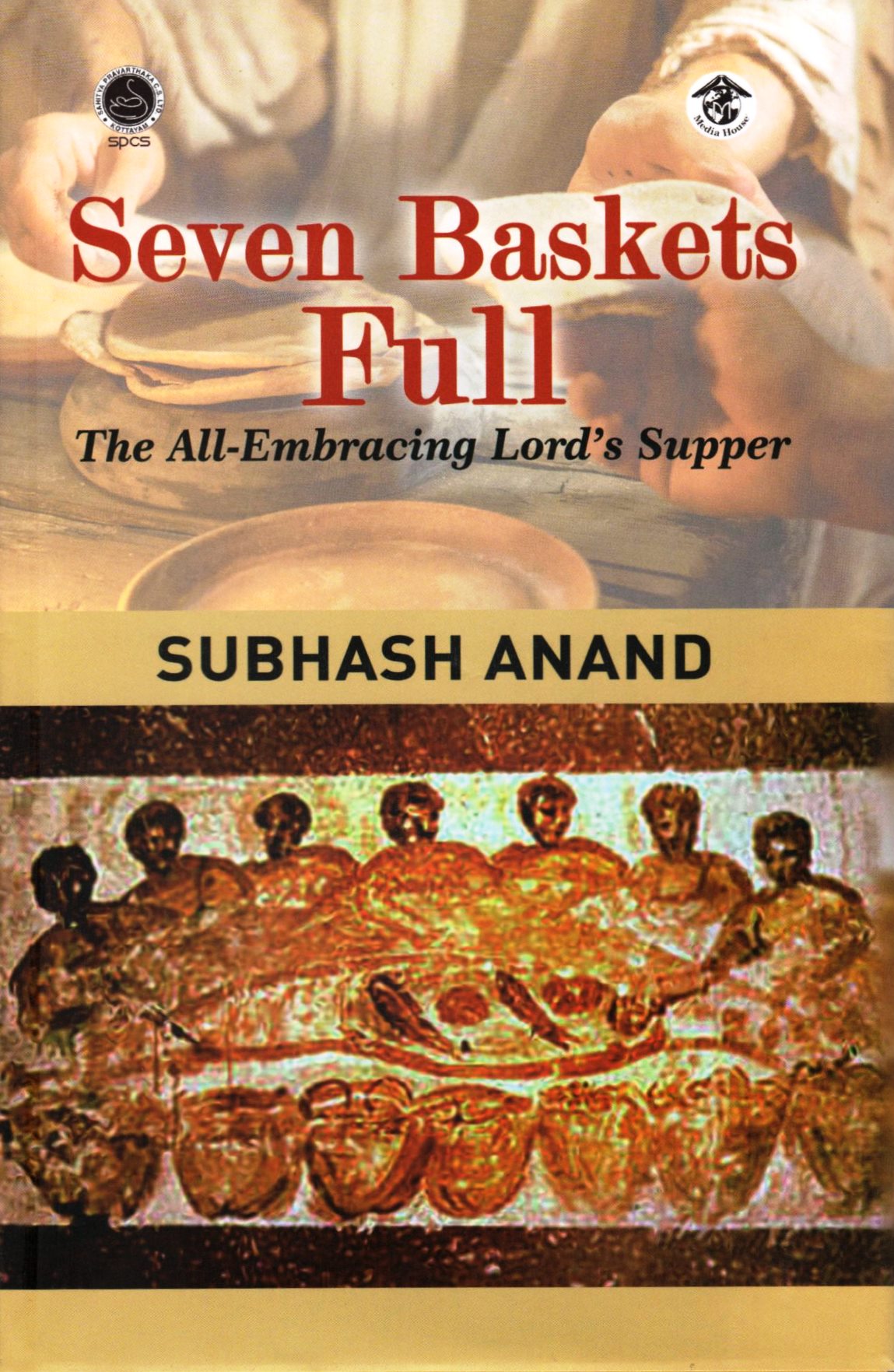
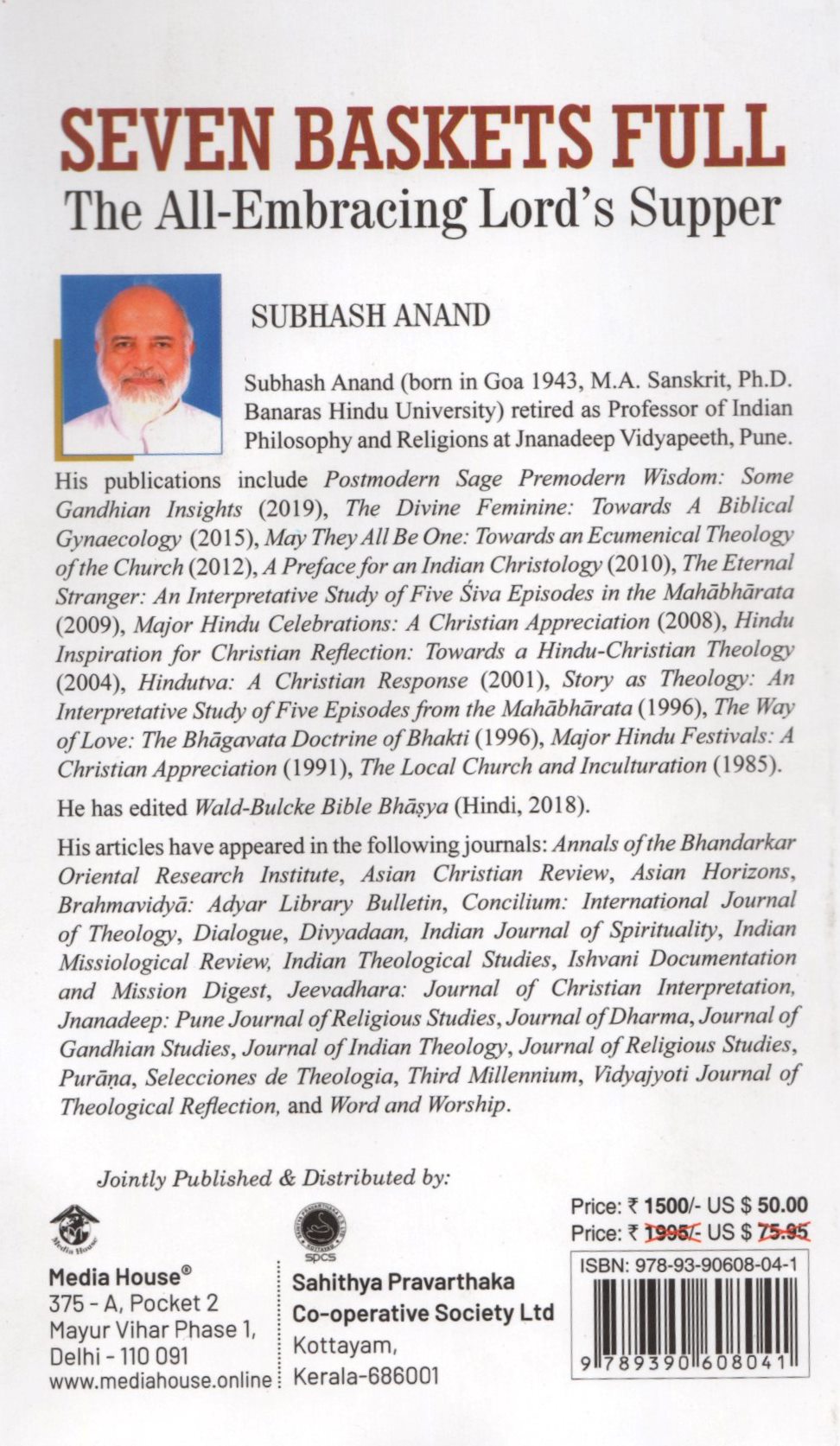
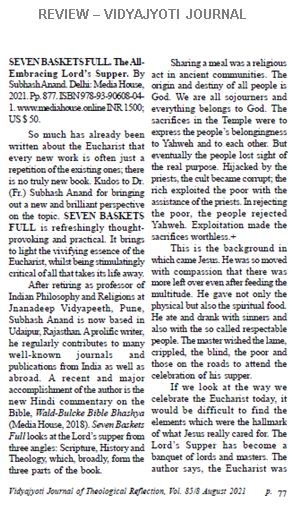


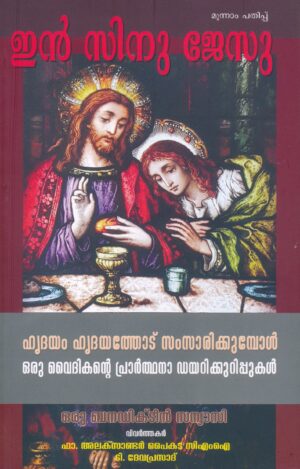
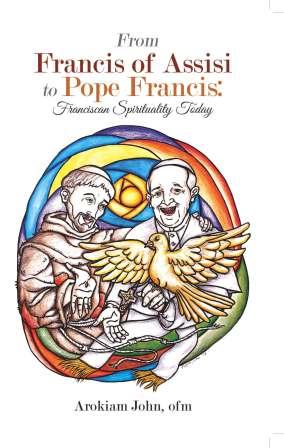
Reviews
There are no reviews yet.